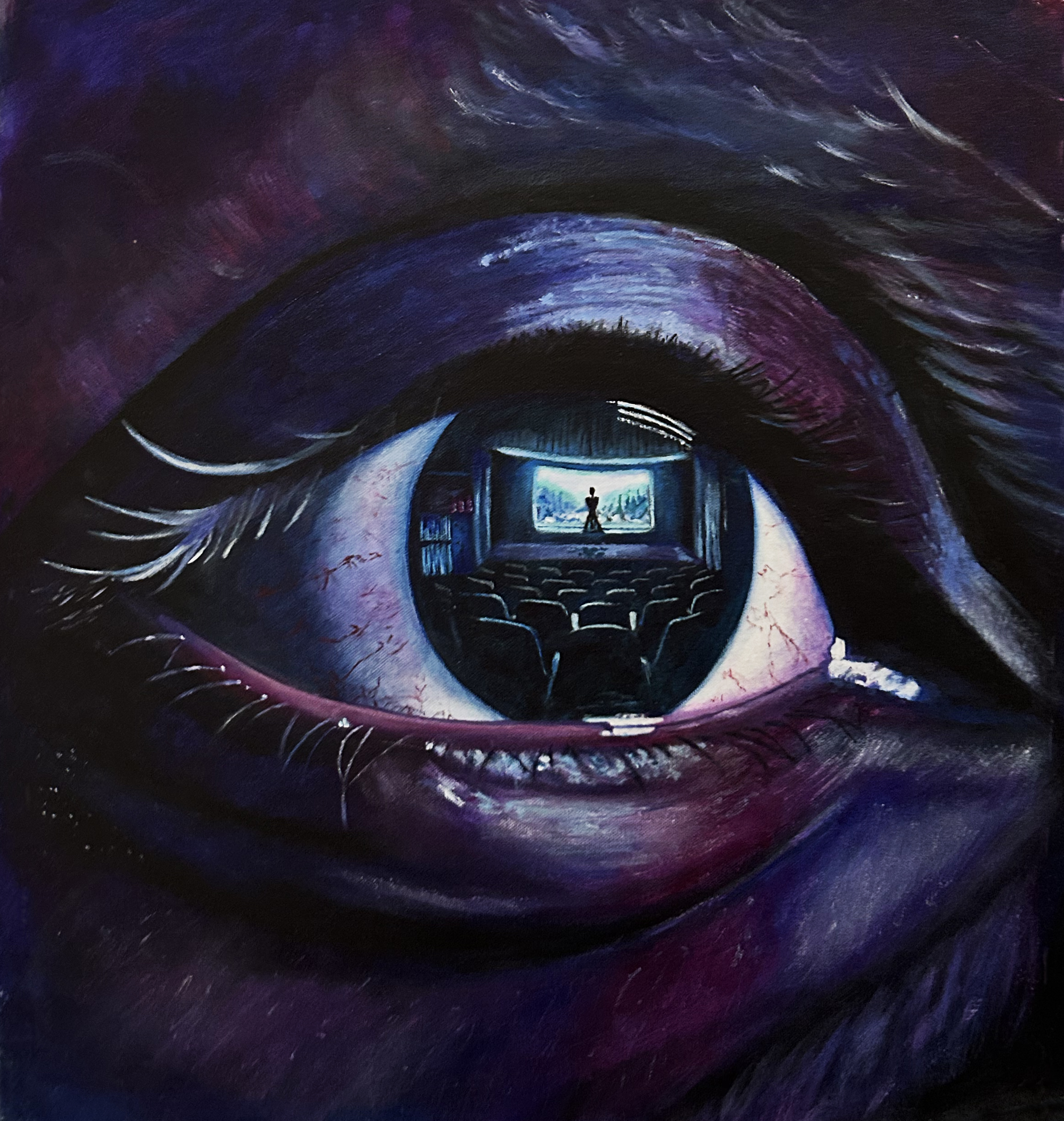Closure

art by Amanda Carmona
On the Evermore Cinema’s final night of operation, damn near the whole town came out to celebrate. Few of us were regulars. The crowd materialized expecting a party.
People in this town were used to seeing their local businesses fade. The downtown had the mood of a memorial, its streets and avenues lined with the carcasses of restaurants and storefronts. Nobody was surprised to learn that Haythorne Street would soon be met with another death. The Evermore’s decline, not well-documented since it was so poorly attended in its final years, was undeniable to anyone who happened to walk by. Those dusty, revolving doors, that deserted, echoing foyer—conspicuous signs of the end.
Over social media, the Evermore’s owner announced the news. Then came the surprise: an all-out retirement bash to mark the closing. Everyone who could make it was invited. The line to enter stretched several blocks. People brought their friends, partners, and children. Inside, silky gold banners hung from the ceiling. Champagne flowed while a local band staged a concert. I watched people chug, dance, and smother the owner with tear-stained hugs. A populace of a no-name county starved of cheer, their pride on life support.
It was a beautiful night before it turned into a disaster.
I didn’t come for the party but for the film that was screening afterwards. This Czech revenge thriller, some little-known New Wave entry. As it slid further into obscurity, the Evermore’s offerings had skewed more international. My grandfather ate that stuff up. Out of the thousands of movies he’d watched during his life, this Czech revenge thriller was his favorite.
My grandfather died while I was overseas at Oxford. I relied on my mother to provide updates on his condition. She was an unreliable narrator. I could tell she was withholding details. It was her way of sparing me and, I suspected, herself. Never did I press for more information, however. Bearing witness is a hefty responsibility, and sometimes you just accept the best people can manage without falling apart.
Her final update was sudden. I’d been walking out of a Latin exam, feeling uncertain about the quality of my translations. Snow flurries powdered my knit beanie. An endless gray sky stretched before me, its formless canvas magnifying my sense of disorientation. Then my phone pinged. “He’s gone,” said the message. At once the world around me was solid and I felt it, my knees falling onto the cold cobblestone. Inactive, the screen went dark.
Together, the partygoers and I filed into the auditorium. I made sure to be at the head of the line so I had my pick of the seats. I found the one center-left four rows back from the screen, my grandfather’s initials monogrammed onto the headrest’s fabric. A Gold Badge Evermore member, he earned two free film tickets for every five he purchased.
In my high school years, I was his regular plus one. He’d drag me to so many foreign films—all these navel-gazing, ponderous stories. These trips worried my mother. Not that she wasn’t supportive of the bonding time, but she feared their “strangeness” would stunt my “American development.” Sometimes the arguments between her and my grandfather got pointed. He asserted that American films were bad for the soul. Too many showed you what you thought you already knew. They were willing to maintain lies. Films from other places showed you things never before seen, even things you’d otherwise avoid. They did their best to tell the truth.
Somewhere in this Czech film, I hoped to locate a kernel of my grandfather’s truth. I wanted to inhabit his space, see what he saw. Perhaps then he would cease to haunt my dreams. Then, finally, the ordeal of him would be put to rest.
Except I couldn’t fathom what made this Czech revenge thriller so special to him. No one in the auditorium was a fan, judging from the chorus of frustrated groans and sighs.
I gathered that the protagonist sought to kill the woman who broke his brother’s heart and drove him to suicide. There was little action and much philosophizing. The scene where the protagonist selected his weapon was a fifteen-minute-long static shot of several handguns arranged on a bed comforter, neither the protagonist nor the arms dealer in-frame. The rasp of their disembodied voices had a menacingly spectral quality.
“Why do you want a gun?” asked the dealer.
“To right a wrong. To end my suffering.”
“The road to peace is through your suffering. It is long. It winds. It may be a road without end.”
“But a gun shoots straight. A gun is quick. Only a gun will give me peace.”
“A gun cannot give. A gun only takes.”
“Why do you sell guns?”
“So I can advise those who’ve stooped to purchasing one.”
The climax came when the protagonist approached the woman’s door. He knocked then pulled back his revolver’s hammer. No one responded. Impatient, he broke in through her kitchen window. Stalking the halls, he gleefully raved about the violence he was about to commit, then found the woman collapsed on the bathroom floor. A shot from the hallway, bangs resounding, flashes of light.
In the next shot, the protagonist—shaken but pleased—shuffled into the bedroom. Noticing a paper on her desk, he scanned it. It was a suicide note. Grief-stricken that her former lover had died, she had taken her own life with sleeping pills.
No justice. He had accomplished nothing except debasing himself and desecrating a corpse. His bliss gone, he sat in her desk chair and wept his first tears since learning his brother had passed.
The projector, which had been wavering in clarity for the entire runtime, finally gave out.
We had endured the faulty sound system, the lagging English subtitles, the circuitous, looping narrative, even the malfunctioning AC, which had rendered the auditorium a suffocating sweatbox. But the moment the picture disappeared, leaving us staring at a blank plane with nothing but the wretched crying of a pathetic man, something in that room cracked.
Abe, the Evermore’s long-tenured security guard, struggled to calm the agitated crush of people that swarmed the lobby. From the second-floor balcony the owner looked down at the writhing mass of bodies as if he were God, his wizened face damningly impassive, unconcerned by the clamor of their profanity-laden protests. I remembered him as a gentle, keen man who’d light up whenever my grandfather brought me to see a film. They would chat about cinematic re-releases and retrospectives they’d been tracking, inspiring in each other a mutual zeal. But that night his face was cold, clear he had nothing left to give.
Several people claimed they’d been duped. “What was that?” “That was the end?” “What was that for?”
The owner gave them no answer. Maybe he believed he owed them none, these people who had refused to patronize his business, who came not to celebrate him and his quarter century as a community staple but for their own self-serving jamboree atop the gravestone of his life’s work. Maybe he, in his final night as a man capable of commanding an audience, wished to share where the long, winding road of his journey had led him: to a place of misery. Between he and the mob, there would be no resolution.
Police materialized after some particularly intoxicated patrons threatened bodily harm. A few batons were drawn. We were herded onto the street, the night somewhat punishing with its empty darkness. On the curb, I nodded at stumbling passersby as they swayed up the street or ducked their heads into departing Ubers. Everyone scattered. Whatever earlier camaraderie we had was now dissolved, making our ways home with a haste that evoked escape.
I walked to my mother’s house through the downtown’s historic district and over a short bridge. My grandfather and I used to cover the journey in fifteen minutes, assuming we didn’t stop at the old bookstore cafe on Lehigh Avenue for a post-film debrief. I passed what used to be the bookstore, glancing into the murk through the glass.
My grandfather would always order himself a cappuccino, me a hot chocolate. As he stirred in his extra sprinkle of cinnamon, he’d ask me my thoughts on what we had experienced.
No matter what I told him, my grandfather nodded, beckoning me to speak further, to interrogate more deeply. He would more or less offer the same critique.
“It was so true,” he would declare. “I’m still trying to figure out the lesson. But I feel like I just lived a life.”


